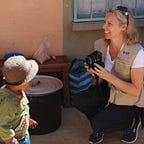Hunger, gender equality and women’s empowerment — What is the connection?
For the World Food Programme (WFP), pursuing gender equality and women’s empowerment is central to ending hunger and saving lives
To achieve food and nutrition security for all people, effective, innovative and equitable food assistance must create conditions that advance gender equality and women’s empowerment. In tackling gender inequalities, WFP addresses the particular needs and priorities of women, men, girls and boys. And because gender inequalities mostly discriminate against women and girls, their empowerment is a priority.
These images offer glimpses of how WFP leverages its scale, reach, logistics, digital expertise and partnerships to empower women and girls for a world of zero hunger.
New School Feeding Platform Pilots integrate additional initiatives like family planning and gender-based violence education.
School feeding programmes are proven to generate a high-return on investment in human capital and local economies, especially the earning power of women. Adding initiatives that have a critical bearing on women and girls such as family planning and gender-based violence education is providing an effective platform for multiplying school meals impact.
There has been a growing global consensus that school feeding programmes generate lasting impacts that can shape the future of a country. A landmark World Bank publication, developed with WFP — ‘Re-imagining School Feeding: A High-Return Investment in Human Capital and Local Economies’ gives compelling evidence of the benefits of investing in school feeding programmes.
Take home food from school helps break barriers to girls’ and boys’ education.
WFP focuses on tackling the inequalities and barriers that adolescent girls encounter in accessing formal education; food security, having opportunities and exercising their rights — through school feeding platforms that include take-home food assistance.
WFP and the Ghana Education Service implemented a take-home ration programme in parts of Ghana where there are wide disparities between boys’ and girls’ education. The rations include maize, vegetable oil and iodized salt, and act as an excellent incentive to draw girls to school and keep them there. Girls must attend school for at least 80 percent of the month to be eligible for the rations. This has led many families to allow their daughters more regular school attendance as the food they receive compensates for the loss of economic activity the girls would have provided. Also, regular school attendance increases girls’ academic performance and has enabled more children to further their education.
Data and responses to the nutrition gap addresses the specific health needs of adolescent girls.
WFP’s wealth of data and experience from our large-scale household interactions give us a clear sense of the nutrition gap and girls’ specific health needs. In the most vulnerable communities, nutrition-sensitive school feeding can offer girls a regular source of nutrients that are essential for their mental and physical development.
Investing in adolescent girls by helping them stay in school is an effective way of preventing early, forced and child marriage and delaying first pregnancy; two outcomes that otherwise can trap women into poverty and chronic ill health.
Working with communities to create and restore common resources addresses gender inequalities in access to and control of resources.
WFP’s Food Assistance for Assets (FFA) programme provides food for work, giving communities real opportunities to take steps out of the hunger trap.
Members of a community are provided with food assistance while they help build or rehabilitate infrastructure to increase their household food security. Community members — both men and women — identify their priorities and WFP supplies the tools and training where needed. Projects include crop farms, vegetable gardens, community access roads and fish ponds.
These programmes give women voice, promote gender equality and give women opportunities.
Akon Majok, pictured here, is a 43-year-old woman farmer and one of the many enthusiastic participants in the food for work programme in South Sudan, supported by Global Affairs Canada. She was born and raised in Kuac South, Warrap state, where she lives with her seven children.
She participated in the programme for three years successfully growing sorghum and groundnuts. She says that the knowledge and training gained through the programme will remain with her forever.
“Now I have skills, no one can take that from me!” she says.
Purchasing from local women producers helps break barriers to women’s fair and profitable access to markets.
WFP’s Purchase for Progress programme connects smallholder farmers to markets by purchasing quality local food. Through the programme, WFP contributes to strengthening local economies and supporting increased resilience and productivity of rural communities, including rural women, contributing to gender equality and the economic empowerment of women in agriculture. As a result, participants in the programme have gained greater control over their lives and a voice in their communities and households.
Emergency relief provides equitable and inclusive responses.
When disaster strikes, WFP’s ability to respond quickly and effectively to reach people in the most remote places on earth is a logistical asset at the service of the global humanitarian community. WFP delivers the infrastructure (ships, planes, trucks, telecommunication and technology) to help the world respond to humanitarian disasters.
Gender responsiveness is a mandatory part of WFP’s humanitarian action. It ensures that food assistance is adapted to the particular needs of women, men, girls and boys.
Cash-based transfers support women’s choice, dignity and decision-making.
Where markets are functioning and local conditions favorable, cash transfers are an effective tool to accelerate progress towards Zero Hunger. They can reduce the cost of providing food assistance, maximize the number of people WFP reaches and can add cash and jobs into the local economy.
Transfers by cash, vouchers, mobile phones or blockchain help enable people in need to decide what is best for themselves, empowering them to make the key decisions in their life. This is especially important for women, giving them a voice and choice in what food they receive.
Find out more about our programmes that give women voice and promote gender equality on wfp.org
